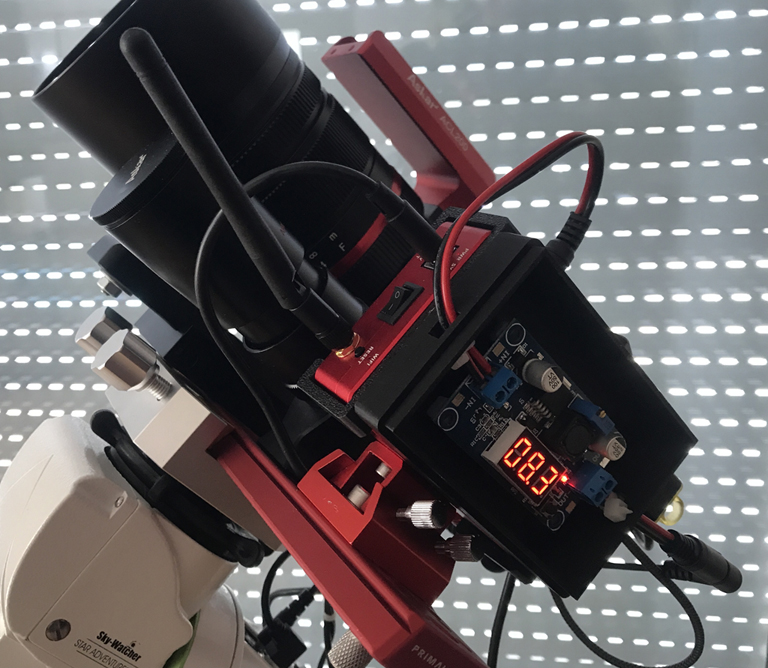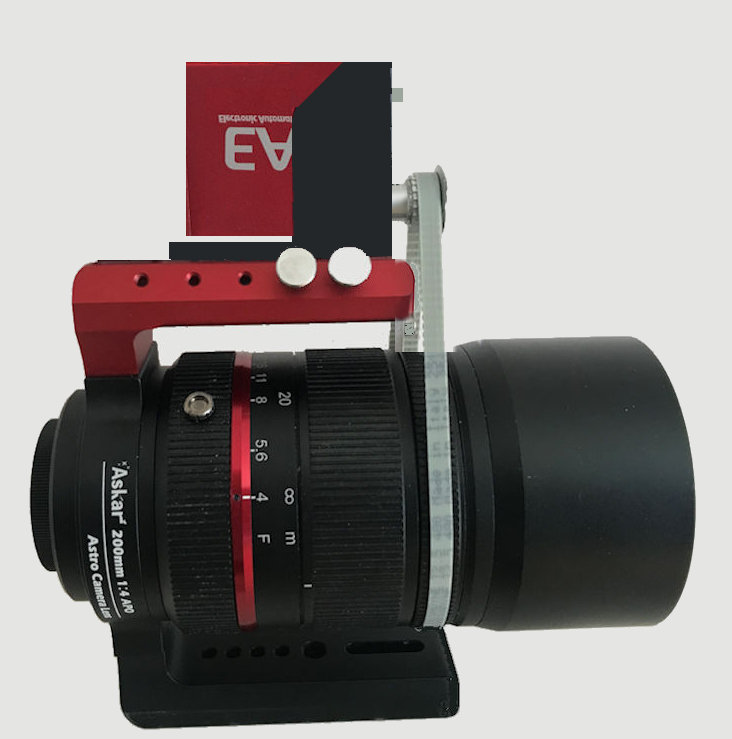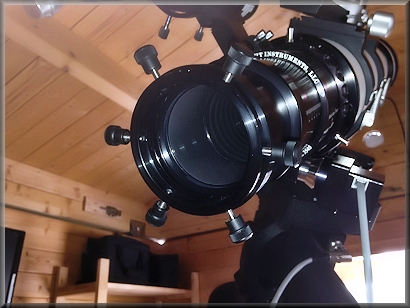Step-Down Converter for EOS Cameras
In order to be able to use a 12V output of the Asiair Plus for the continuous power supply of the Canon EOS, I have
designed a controllable dummy with a small step down voltage converter that regulates the 12V down to 8.4V.
On both sides of the converter, short plugs are screwed together to connect to either USB-C female or DC 5.5x2.1 female power adapter. The converter is installed in a
Appropriately printed box with bracket attached to the Asiair. Works perfectly..
|

|
Filter- and Cameaadaptions on ACL200
In order to be able to use either a DSLR or an eyepiece with an Amici prism on the ACL200, I have
replaced the standard M48 adapter with a short alternative. With these two versions, you come exactly into focus.
|

|
Motorized fine focusing for the ACL200 APO with the ZWO EAF
A simple but effective fine focusing with a printed holder on the handle. For a short belt length, the EAF is used upside down.
The required pulley, ribbon and focuser are standard purchased parts. The correct strap length
as well as the necessary voltage was calculated and precisely assembled with our own solution.
Focusing takes place on the front ring of the ACL200's fine focusing, making it very accurate and fast. My concept is
More cost-effective and practical than the standard Wega solution which is installed under the ACL200, the center of gravity of the axis of rotation
and focuses on the coarse standard ring of the telescope.
|

|
A mobile setup with the new TS-Optics TSAPO60f5Q on a GEM28 with Berlebach tripod
With the
new TS-Optics Flatfield APO on a GEM28 with
Berlebach tripod once again a mobile setup with convenient ZWO equipment
and documented this with several reference shots.
Optron GEM28 GoTo Mount
TRIPOD REPORT 172 ASTRO + GEM28 Adapter + SHELF
TS-Optics TSAPO60f5Q 60 mm f/5 Quadruplet Flatfield APO
ZWO EAF5V Focuser with Temperature Sensor
Galaxy Viewfinder 8x50 RA, Red 90 Insight with Crosshair Eyepiece
TS-Optics Guiding Set with 50 mm Guide Scope and ASI120mini
Neumann Aurora Flatfield Luminous Film D=100 mm, with 12 V inverter
2 shortened and assembled heating bands
ASI533MC-Pro Camera with Filter Wheel
Asiair Plus for complete control of the setup
Short and secure cable management
Symmetrical design of the imaging train for optimal balance
|

|
GEM28 Tripod-Adapter
To make the excellent GEM28 mount even lighter, a lightweight carbon tripod is a good choice. This requires a
special adapter that I designed and commissioned as a small series production. In the meantime many times,
also used internationally.
|

|
Rolling hull under CGEMII
In order to be able to move my CGEMII more easily to the prepared imaging position, I have a
highly functional rolling base and made it myself with inexpensive purchased parts.
|

|
Fine focusing for lenses or the Space/White/Redcat
A simple but effective fine focusing for lenses on the DSLR with attached Geoptik hot shoe adapter
for for the telescopes on the handle.
The required pulley, ribbon and focuser are standard purchased parts. The correct strap length
as well as the necessary voltage was calculated and precisely assembled with our own solution.
The Lacerta microfocus can be motorized very easily with the MSM30 from Starlight Instruments (see WhiteCat image)
|

|
Adapter for the MSM30 focuser on the Esprit80
To be able to attach the Starlight stepper motor for 2.5" & 3" Feather Touch focusers to the Esprit80,
I had Tommy make me an adapter ring. Works perfectly.
Below Esprit80 with focus motor, flattener, tilt adapter, filter drawer and ASI294 at the correct distance
|

|
Sliding double attachment
In my experience, one problem with heavy equipment is the manual left/right shifting of the
Telescopes to get back into balance, e.g. when the imaging trains change or swaps.
For this reason, the prism rail was additionally equipped with a rack and the prism clamp
equipped with a gear.
Obviously, Geoptik found my concept with the rack and gear so interesting,
that they recreated it in a similar way without coordination with me.
Unfortunately, there is no patent protection on such ideas.
|

|
Fitting of an Esprit 100/550 according to my specifications
When using a large Moravian G3-11000 camera with a space-consuming Offaxis guide, the
obligatory 55mm working distance of the original flattener is exceeded. So I decided to
to look for an alternative with a longer working distance, namely with the 2.5" full-frame
Flattener from Teleskop-Service.
I also wanted to replace the original 3" focuser with the 3" Feathertouch from Starlight Instrument.
In order to have it as stable as possible, the version with only 38 mm travel was used and adapted so that
that the focus is reached in the middle of the stroke path.
And as a third specification, a dovetail rotation adapter should be manufactured so that the second
camera, a G2-8300 with its own Offaxis guider, can be easily pushed in and automatically inserted into the
the perfect distance as the G3-11000 is.
Here is the finished Esprit with custom-made adapters from tube to Feathertouch, from Feathertouch to
Flattener and the dovetail adapter with 6 screws to attach the camera. Everything perfect
solved by Tommy Nawratil and his team.
|



|
TEC Rorationadapter
In order to be able to rotate my large Moravian cameras on the TEC stably, I designed and made an M68 rotation adapter with 6 locking screws. Very stable.
|

|
EQ8 Upgrade
The EQ8 can image beyond the meridian up to the hardware stop at approx. 30° (2 hours),
however, even on the short Esprit telescope, the camera would collide with the mount beforehand.
For this reason, I have a very stable extension of the telescope adapter (colored red in the picture above)
and placed between the mount and the telescope. With this, I was now able to do so even at the worst possible
DEC position about 1.75 hours beyond the meridian without it colliding anywhere.
For security reasons, I have set a time lock before the hardware stop of the EQ8 with EQASCOM.
|

|
Bended pier
In order to image from east to west continuously without PierFlip even with 2 longer telescopes on my special
double mount, the EQ8 (or another mount) must be mounted on a modified
bended pier. It can be used at any location,
since the pole height is not permanently built into the pier, but is used with the usual methods of
mount. I have never understood why in general (as is also discussed in the forums)
the polar orientation is shifted into pier depending on the location instead of leaving it where it belongs.
My concept was realized in a small series by JD-Astronomie for me and 3 colleagues.
The response from colleagues who already have the articulated column in productive use is extremely
positive. In this respect, I am particularly pleased that my theoretical considerations and plans are proving themselves in practice.
|


|